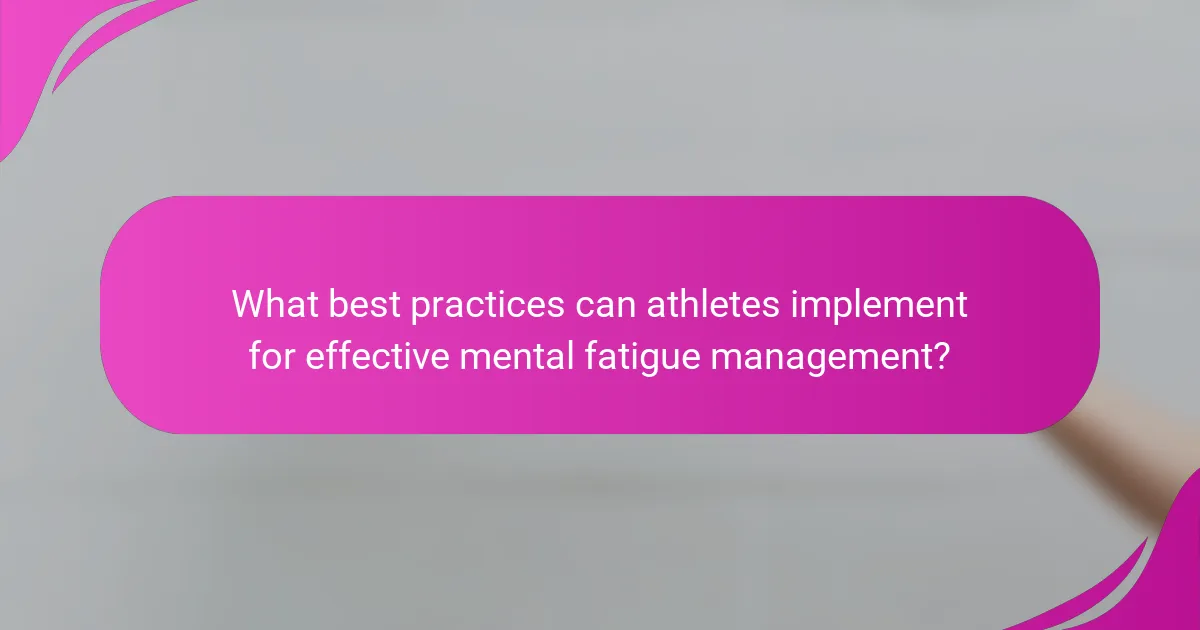Managing mental fatigue is crucial for athletes seeking optimal performance. This article explores techniques such as mindfulness, structured rest, and cognitive reframing. It highlights tools like mental training apps and biofeedback devices. The benefits include improved focus, reduced stress, and enhanced athletic outcomes.

What is mental fatigue management for athletes?
Mental fatigue management for athletes involves strategies to enhance mental resilience and performance. Techniques include mindfulness, visualization, and structured rest periods. Tools like mental training apps and cognitive behavioural strategies support these techniques. Benefits encompass improved focus, reduced stress, and enhanced overall performance, leading to better athletic outcomes.
Why is mental fatigue significant in sports performance?
Mental fatigue significantly impacts sports performance by reducing focus, decision-making, and reaction times. Athletes experiencing mental fatigue may struggle to maintain optimal performance levels, leading to decreased effectiveness in training and competition. Research indicates that mental fatigue can impair physical performance, as the mind and body are interconnected. Effective mental fatigue management techniques, such as mindfulness, mental breaks, and structured routines, can help athletes maintain peak performance and enhance overall well-being.
What are the common causes of mental fatigue in athletes?
Common causes of mental fatigue in athletes include overtraining, lack of sleep, high stress levels, and inadequate nutrition. Overtraining can lead to physical and psychological exhaustion, while insufficient sleep impairs cognitive function. High stress levels from competition or personal issues can further contribute to mental fatigue. Lastly, poor nutrition fails to provide the necessary energy and mental clarity for optimal performance.
How do training loads contribute to mental fatigue?
Training loads significantly contribute to mental fatigue by increasing cognitive demands during physical exertion. High training volumes can lead to overtraining, which negatively affects mental resilience. Athletes may experience reduced focus, motivation, and decision-making abilities as a result of accumulated fatigue. Managing training loads through periodization and recovery strategies is essential for maintaining mental performance. Regular assessments of training intensity and volume help in optimizing both physical and mental well-being.
What role does competition pressure play in mental fatigue?
Competition pressure significantly contributes to mental fatigue in athletes by intensifying stress and cognitive load. This pressure can lead to decreased focus, increased anxiety, and diminished performance. Athletes often face unique attributes such as heightened expectations and public scrutiny, which can exacerbate mental fatigue. Managing this fatigue through techniques like mindfulness, proper rest, and mental conditioning can enhance performance and overall well-being.

What are the universal techniques for managing mental fatigue?
To manage mental fatigue effectively, athletes can utilize techniques such as structured rest, mindfulness practices, and cognitive reframing. Structured rest includes scheduled breaks to recharge. Mindfulness practices, like meditation, enhance focus and reduce stress. Cognitive reframing helps athletes shift negative thoughts into positive perspectives, improving mental resilience. These techniques collectively enhance performance and well-being.
How can structured rest periods enhance recovery?
Structured rest periods significantly enhance recovery by allowing the brain to recover from mental fatigue. These periods improve focus, decision-making, and overall performance. Research indicates that athletes who incorporate structured breaks experience reduced stress and improved cognitive function. By alternating between intense training and restorative rest, athletes can maintain optimal mental clarity and resilience.
What cognitive strategies are effective in reducing mental fatigue?
Effective cognitive strategies to reduce mental fatigue include mindfulness techniques, structured breaks, and goal-setting methods. Mindfulness practices, such as meditation, enhance focus and reduce stress. Structured breaks, like the Pomodoro Technique, promote recovery and maintain energy levels. Goal-setting methods provide clear direction and motivation, reducing feelings of overwhelm. These strategies collectively enhance mental resilience and performance in athletes.
How does nutrition impact mental fatigue management?
Nutrition plays a crucial role in managing mental fatigue for athletes. A balanced diet enhances cognitive function, improves focus, and reduces fatigue. Key nutrients like omega-3 fatty acids, antioxidants, and complex carbohydrates support brain health and energy levels. For example, foods rich in omega-3s, such as fish and flaxseeds, can significantly improve mental clarity. Additionally, hydration is essential; even mild dehydration can impair cognitive performance. Therefore, athletes should prioritize proper nutrition and hydration to effectively manage mental fatigue.
Which foods are beneficial for mental clarity?
Foods that enhance mental clarity include fatty fish, blueberries, turmeric, broccoli, pumpkin seeds, and dark chocolate. These foods are rich in omega-3 fatty acids, antioxidants, and essential nutrients that support brain health and cognitive function. For example, fatty fish like salmon provide DHA, a vital component for brain structure. Blueberries contain antioxidants that may improve communication between brain cells. Turmeric has curcumin, which may increase brain-derived neurotrophic factor (BDNF), supporting neuron growth. Incorporating these foods can help manage mental fatigue effectively for athletes.
What hydration strategies can athletes adopt?
Athletes can adopt hydration strategies like pre-hydration, regular fluid intake during activity, and post-exercise rehydration. These practices help maintain performance and reduce mental fatigue.
Pre-hydration involves drinking fluids before exercise to optimize hydration levels. Regular fluid intake during activity ensures athletes stay hydrated, particularly during prolonged exertion. Post-exercise rehydration is crucial for recovery and can include electrolyte-rich drinks to replenish lost nutrients.
Incorporating these hydration strategies can enhance focus and cognitive function, ultimately benefiting athletic performance.

What unique tools can athletes utilize for mental fatigue management?
Athletes can utilize mindfulness apps, biofeedback devices, and virtual reality environments for mental fatigue management. These tools enhance focus, reduce stress, and improve recovery. Mindfulness apps like Headspace provide guided meditation, while biofeedback devices track physiological responses to stress. Virtual reality can simulate calming environments for relaxation.
How can technology assist in monitoring mental fatigue?
Technology can effectively monitor mental fatigue in athletes through various tools and techniques. Wearable devices track physiological indicators like heart rate variability and sleep patterns, providing real-time data on fatigue levels. Mobile applications offer cognitive assessments to gauge mental state, while biofeedback devices help athletes understand stress responses. These technologies enhance training by enabling tailored recovery strategies.
What apps are popular for mental performance tracking?
Popular apps for mental performance tracking include Headspace, Calm, MyFitnessPal, Moodfit, and Insight Timer. These applications help athletes manage mental fatigue by providing tools for meditation, mood tracking, and personalized insights. Each app offers unique features, such as guided sessions or analytical reports, enhancing mental resilience and focus.
What role do sports psychologists play in mental fatigue management?
Sports psychologists play a crucial role in managing mental fatigue in athletes by implementing tailored strategies to enhance mental resilience and focus. They utilize techniques such as cognitive-behavioral therapy, mindfulness, and visualization to combat fatigue. These professionals assess individual needs, enabling athletes to develop coping mechanisms that improve performance and recovery. By fostering a positive mindset, sports psychologists help athletes optimize their mental energy and maintain peak performance levels.

What are some rare attributes of mental fatigue management?
Some rare attributes of mental fatigue management for athletes include personalized cognitive training, biofeedback integration, and the use of neurostimulation devices. These techniques are not commonly utilized but can enhance mental resilience and performance.
How does individual variability affect mental fatigue experiences?
Individual variability significantly influences mental fatigue experiences among athletes. Factors such as personality traits, physical conditioning, and cognitive strategies shape how fatigue manifests and is managed. For instance, athletes with high resilience may cope better, reducing perceived fatigue. Additionally, unique attributes like sleep quality and stress levels can also affect mental fatigue, leading to diverse experiences even among individuals in similar training environments. Understanding these variations enables tailored mental fatigue management strategies, enhancing performance and well-being.
What are some uncommon techniques used by elite athletes?
Elite athletes utilize uncommon techniques for mental fatigue management, enhancing performance and resilience. Techniques include visualization, biofeedback, and mindfulness meditation.
Visualization involves mentally rehearsing performance scenarios to build confidence and reduce anxiety. Biofeedback uses technology to monitor physiological responses, helping athletes control stress and maintain focus. Mindfulness meditation promotes present-moment awareness, reducing mental clutter and improving concentration.
These techniques offer unique benefits, such as improved emotional regulation and enhanced cognitive function, crucial for peak athletic performance.

What best practices can athletes implement for effective mental fatigue management?
Athletes can implement several best practices for effective mental fatigue management. Techniques include structured rest periods, mindfulness training, and cognitive behavioural strategies. Tools such as performance journals and mental conditioning apps enhance focus and resilience. Benefits encompass improved concentration, reduced stress, and enhanced overall performance.
How can athletes create a personalized mental fatigue management plan?
Athletes can create a personalized mental fatigue management plan by assessing their unique stressors and recovery needs. Start by identifying specific triggers of mental fatigue, such as training intensity and competition pressure. Next, incorporate techniques like mindfulness, structured breaks, and mental visualization to enhance focus and resilience. Regularly evaluate the effectiveness of these strategies and adjust them based on performance outcomes and personal preferences. This tailored approach fosters optimal mental well-being and athletic performance.
What common mistakes should athletes avoid when managing mental fatigue?
Athletes should avoid overtraining, neglecting rest, ignoring mental health, and failing to set realistic goals. Recognizing these mistakes can enhance mental fatigue management. Overtraining leads to burnout, while adequate rest is crucial for recovery. Ignoring mental health can exacerbate fatigue, and unrealistic goals may cause unnecessary stress.
What expert insights can enhance mental fatigue management strategies?
Expert insights for managing mental fatigue in athletes include mindfulness techniques, structured recovery protocols, and cognitive behavioural strategies. Mindfulness practices enhance focus and reduce stress, while recovery protocols optimize rest periods. Cognitive behavioural techniques help reshape negative thought patterns, improving mental resilience. Regularly assessing mental fatigue levels can guide adjustments in training and recovery, ensuring optimal performance.